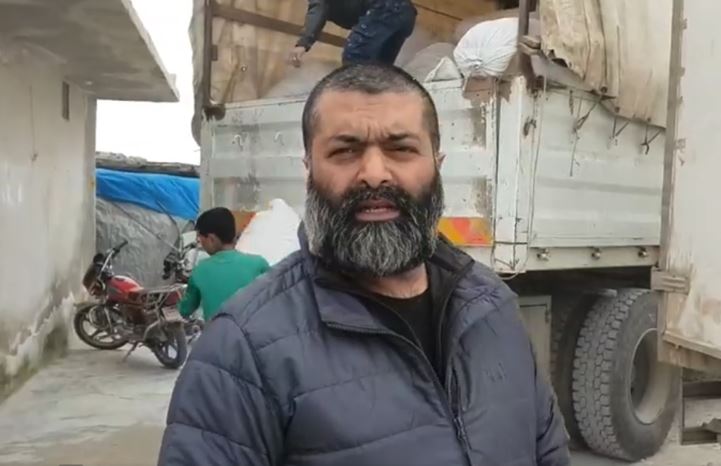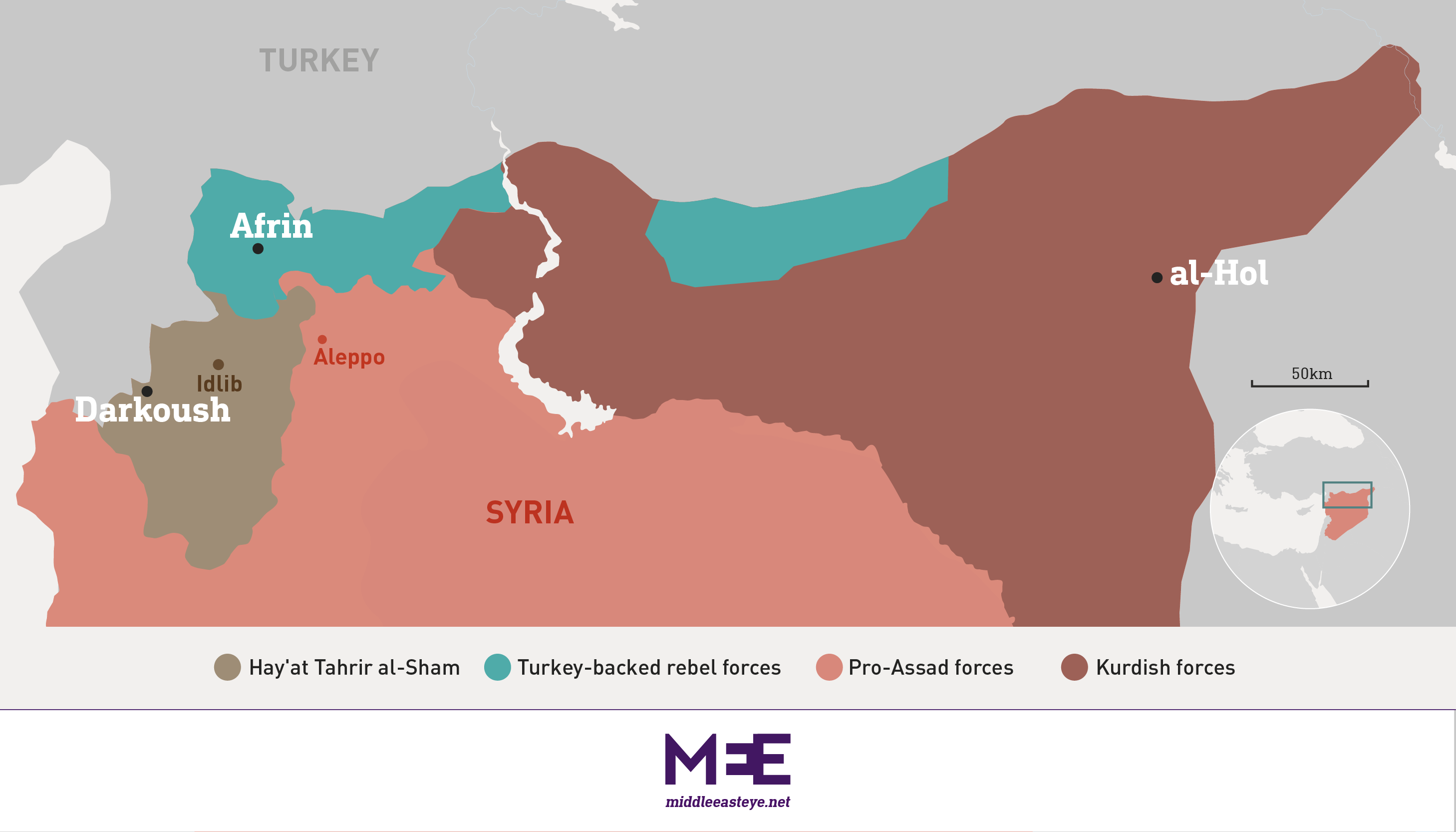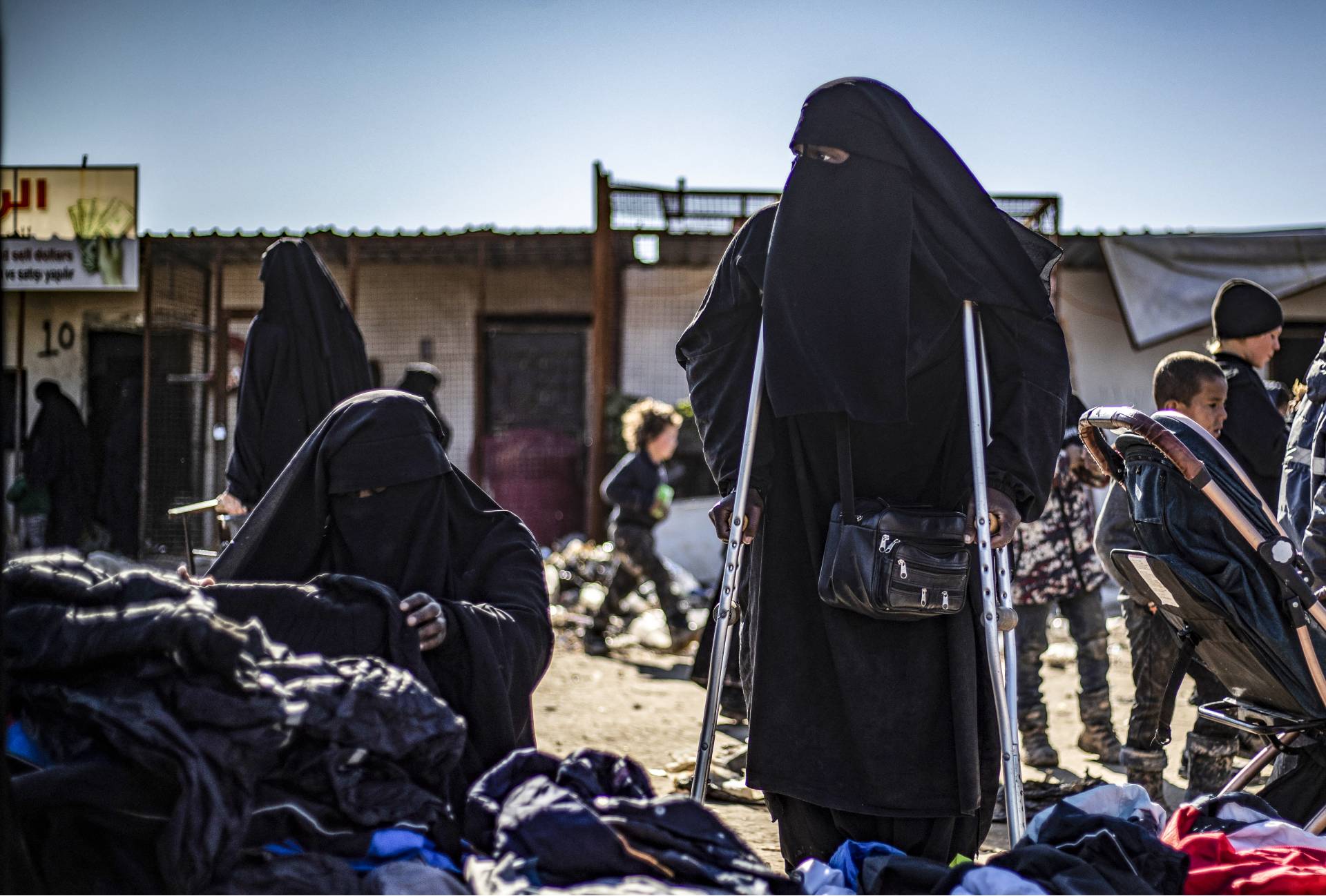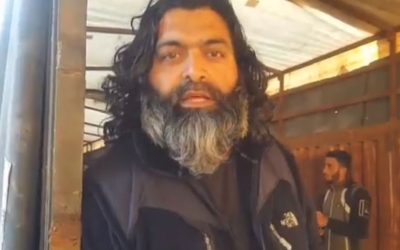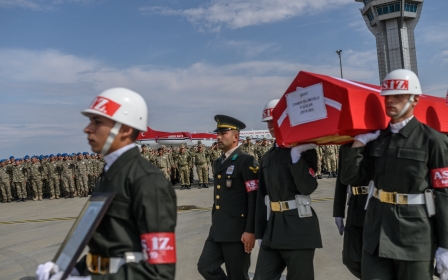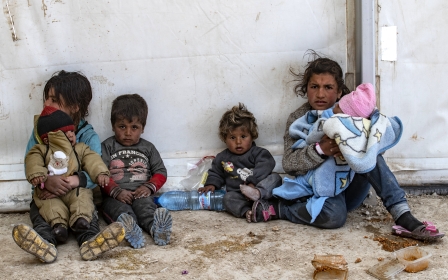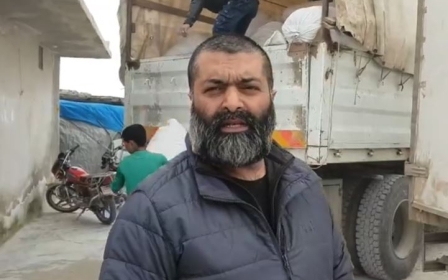EXCLUSIVE: Women smuggled out of al-Hol held by HTS in Idlib camp
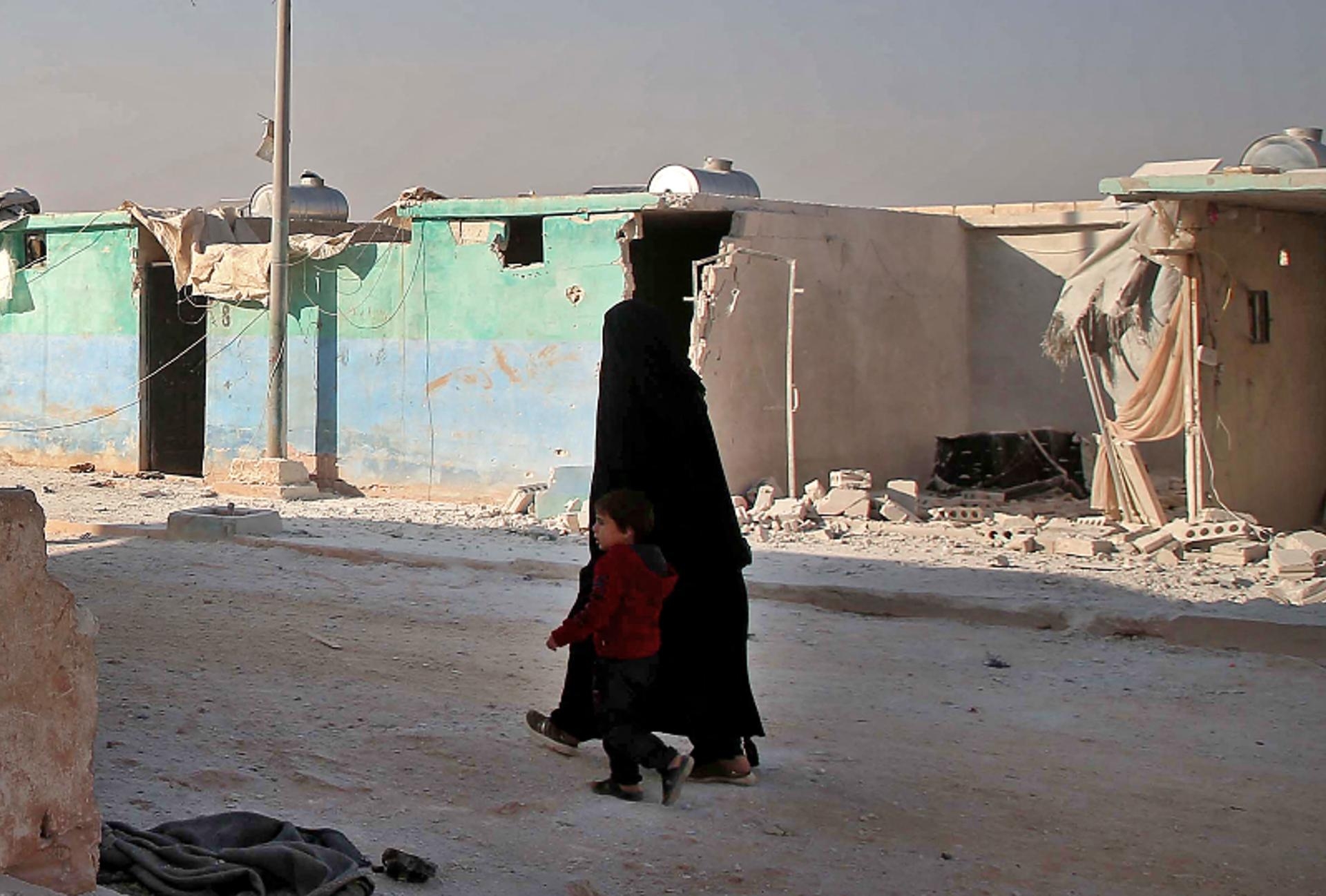
Foreign wives of suspected Islamic State fighters and their children are being smuggled from al-Hol camp in eastern Syria to Idlib and detained in another camp under the control of Hay’at Tahrir al-Sham (HTS), Middle East Eye has learnt.
In order to leave, the women must agree to marriages vetted by HTS or risk being smuggled across the border into Turkey, sources familiar with the camp told MEE.
About 40 women and their children are currently living at the Al-Jumailya camp in western Idlib, close to the border with Turkey.
Most of the women are foreigners, MEE’s sources said, with many of them Russian nationals from the Muslim-majority southern republics of Chechnya and Dagestan. Some Syrian women live in a separate sector of the camp.
Some of the women escaped from the Kurdish-run al-Hol camp, near Syria's border with Iraq more than 400 kilometres away, where conditions have been condemned by human rights organisations, and reached Idlib through people-smuggling networks.
New MEE newsletter: Jerusalem Dispatch
Sign up to get the latest insights and analysis on Israel-Palestine, alongside Turkey Unpacked and other MEE newsletters
Others travelled to Idlib from elsewhere in Syria of their own volition, but were then detained by HTS security forces over their suspected links to IS.
HTS, which controls most of Idlib, is a hardline militant group dominated by a former al-Qaeda affiliate in Syria that split from and fought with IS earlier in Syria's civil war, and is wary of IS infiltration and attacks in Idlib since the group's military defeat in eastern Syria.
One of MEE’s sources, who spent time in the camp, admitted that some new arrivals considered conditions in Al-Jumailya to be “paradise” compared with al-Hol.
But she added: “Once you are there you cannot leave. That is not freedom. You do not have any freedom there.”
Camp built by British man
Sources told MEE that the al-Jumailya camp was controlled by a British man, Mohammed Shakiel Shabir, who is originally from Birmingham and who MEE reported in 2018 had been stripped of his British citizenship over his alleged ties to an al-Qaeda-aligned group.
Shakiel has always denied any allegiance to HTS or any other group. He says he is an aid worker whose work over many years “speaks for itself”.
Shakiel confirmed he had built the camp and been involved in running it. But he said he had been ordered by HTS to hand over the camp to its control because of security concerns.
“This is not even a camp. They are houses that I built and fully furnished. There is free electricity, free internet, free water,” he told MEE.
“They are not in a prison and can leave when they need to, but they have to notify the camp in charge. These were the rules about six months ago. I left the camp and gave it to HTS to control.”
Responding to questions posed to MEE via a messaging app, Shakiel said he had handed over the camp as a consequence of a "direct order from the security department of HTS due to the safety of myself against attacks from the Dawla group [IS] and also to maintain the security of the sisters in the camp".
"They have sufficient evidence that shows that some sisters from inside the camp were cooperating with Dawla groups in order to harm the people here under the HTS-controlled areas," he said.
"I am a humanitarian and I do not have power to maintain and implement such safety procedures so it only makes sense that I take the advice of HTS security council and hand over the camp to them."
Several of MEE’s sources said HTS had links to smuggling networks that were bringing women from al-Hol to Idlib via Afrin in territory controlled by Turkish-backed Syrian rebels.
One source said: “They are desperate. Some of them have been held by the SDF for years in very bad conditions and they just want to get out. The funny thing is they only take the pretty ones. The ones that people would like to marry.”
Shakiel denied any involvement in smuggling women from al-Hol.
“This has nothing to do with me or the HTS group. These women are in direct contact with smugglers and have people who are paying large amounts of money to buy their freedom.”
Al-Jumailya is one of many camps hosting displaced Syrians and foreign nationals in the rugged landscape and farmlands around the nearby Duwaysat reservoir, west of the town of Darkoush.
Some of the camps in the area are associated with the Turkistan Islamic Party (TIP), an independent Uighur militant group based in the city of Jisr al-Shughour, west of Idlib province.
Sources familiar with al-Jumailya camp described it as surrounded by a high wall and accessed via a main gate. The residents live in small houses with blue walls and four rooms consisting of a kitchen, bathroom, bedroom and living area.
Each house has a water tank and solar panel on the roof. MEE’s sources said the buildings were clean and in good condition.
A larger building is used as a classroom for the children.
Women coming from IS-held areas are expected to attend classes “so they learn the right things”, one source said. Another source described the lessons as “deradicalisation classes”.
Women receive regular food packs, which sources described as being made up of donations from western countries including lentils, rice, oil, kidney beans and occasionally sweets.
Sources said the camp was unguarded, but far from any farms or villages. Residents are sometimes accompanied to Darkoush to go shopping but they are expected to return.
In some cases, MEE's sources said, women who had been able to escape were pursued by HTS security forces and either imprisoned or returned to al-Jumailya.
Sources spoken to by MEE said Shakiel has been responsible for overseeing the foreign women held at the camp.
“He distributes aid there. He brings people there. He ensures people stay there,” said one woman.
Shakiel said claims residents were imprisoned or subject to any threats or coercion were “lies”.
Marriage alternatives
Women in the camp face pressure to marry husbands vetted by HTS in order to prove that they do not support IS and pose a potential security threat, several sources said.
But one of MEE’s sources said that most women who had travelled to Syria and lived under IS rule had been left “traumatised” by the experience and no longer wanted anything to do with the group.
“A lot of them went there without knowing how things would end up for them there. They were sold a lie at the end of the day,” she said.
“These are traumatised women. They are not interested in anything else other than looking after their children. Some of them have had their children die. All they want is to remain anonymous and live a normal life away from what they escaped from.”
Shakiel said HTS only asked women to provide details about men they wanted to marry “for the safety of the women”.
“If they choose to marry, then they are married in an Islamic court and the judge in charge takes the responsibility to make sure the women get their full rights,” he said.
“Because of their involvement with Dawla, they are only allowed to live in this housing complex because in the past, many women from Dawla were involved in the bombing and killing of many HTS and civilians in the HTS-controlled areas."
In some cases, MEE’s sources said, women living at the camp are already married. Some have been able to contact their husbands held in Kurdish prisons via the International Committee of the Red Cross. Others do not know where their husbands are or whether they are dead or alive.
“There is something in Islam called khula, where the woman requests a divorce. And he [Shakiel] is putting pressure on these women to make khula. He says you will never meet your husband again so you can just get divorced,” said a woman who had spent time in the camp.
Shakiel denied putting pressure on anyone to marry.
He said: “The majority of the sisters in the camp have a lot of respect for me because I give them respect also. There are however a few who are still loyal to Dawla, and try their best to spread lies about me and the group HTS.”
Some women held in the camp had married men without HTS’s approval after arriving in Idlib, MEE's sources said. According to them, the women’s husbands were subsequently detained and imprisoned by HTS security forces and accused of being linked to IS.
Sources spoken to by MEE linked the detention of the women and their husbands to a wider crackdown by HTS on rival militant groups and foreign nationals based in territory under their control.
“The security forces, they are going around Idlib City now asking [foreign] women ‘Who is your husband?’. If you don’t have a husband they say you have to leave,” said a source.
“And if you don’t leave, they take you to prison and after prison you will be sent to al-Jumailya.”
Leaving for Turkey
According to sources, women who refuse to marry someone vetted by HTS have another alternative - being handed over to local people smugglers to be taken across the border to Turkey.
But many women fear being sent to Turkey because of the deadly dangers associated with smuggling routes, which include the risk of being shot at by Turkish border guards, robbery and abuse.
Sources said women and their children were transported in small boats along the Orontes river, which runs along the Turkish-Syrian border, from Darkoush, and then made to walk for hours across fields and rough terrain.
Those who make it across are often picked up by Turkish border patrols and returned to Syria. If detained, they face investigation and possible imprisonment or repatriation to their home countries.
“No one is allowed to leave. The only way for you to be able to get out from the camp is to go to Turkey. They will take care of it for you. Or you go and get married,” said a source.
Another woman familiar with the camp, also speaking on condition of anonymity, said: “A lot of people don’t want to end up in Turkey because they don’t know what the consequences will be for them. It is a threat that is used against them.”
Shakiel denied that women and children were being smuggled into Turkey against their will.
He said: “Many of the women want to go to Turkey because they want to live a normal life and they are aware of the risks and dangers involved and they are willing to take those risks. They hand themselves over to the Turkish authorities on the borders willingly."
HTS denial
Shakiel has been involved in aid work in opposition-held Syria since 2015.
His work in Idlib, according to his own social media posts and sources familiar with his work, has included coordinating aid donations, driving ambulances, and supporting rescue operations after air strikes.
People who have followed his work describe him as “hard-working” and say that he has “done a lot of good”. Shakiel told MEE in 2019 he had been a “fulltime humanitarian” in countries including Haiti, Pakistan and Myanmar for more than 15 years.
But sources said Shakiel had moved closer to HTS in the same year after its security forces rescued him from a criminal gang which had held him hostage for two months.
Shakiel told MEE: “I am not in any shape or form affiliated to HTS on a basis of allegiance. I respect the work that they are doing and they being the ruling group, I have to respect their authority.”
MEE understands that many foreign nationals based in Idlib face pressure to maintain a relationship with HTS for their own security.
An HTS leader denied that women at the al-Jumailya camp were being mistreated or threatened, but said the group had a right to monitor them, including gathering information about their proposed marriages, because of security concerns.
He said: “They are Muslim women who came to Syria and were victims of ISIS, then they became victims of the SDF [Syrian Democratic Forces], imprisoned in difficult conditions and exposed to violations, and it is our duty to help them, at a time when their country refuses to take them back.
“Anyone, whether with HTS or others, can communicate with women there and smuggle them to the area. There is no private camp… nor do we force women to do anything or threaten them.”
He also linked restrictions placed on the women at the camp to the threat posed by IS.
“We want to protect ourselves and the security of the region from sleeper cells, unknown attacks, and assassinations.
“It is our right to know how, with whom and why they came, so all women coming from eastern Syria, whatever their nationality, must give us all their data, including where they will live, who they will marry, why and how they got to know the man.”
This article is available in French on Middle East Eye French edition.
Middle East Eye delivers independent and unrivalled coverage and analysis of the Middle East, North Africa and beyond. To learn more about republishing this content and the associated fees, please fill out this form. More about MEE can be found here.


